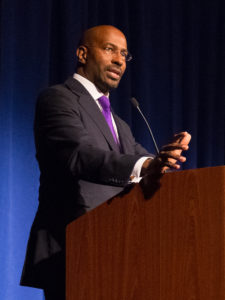Seth Godin on How the Media Undermines the Most Important Aspects of Our Culture—And How it Could Easily Fix This

Editor’s Note from Shel Horowitz: this was originally published on Seth’s blog under the title, Where Will the Media Take Us Next? I am a long-time reader and fan of author and teacher Seth’s daily blog (and thrilled that he gave me a terrific endorsement for my 10th book, Guerrilla Marketing to Heal the World). I have often linked to his blog posts on Facebook, and sometimes corresponded with him. This one struck me as one I wanted to share on my own website. Used with his permission. And now, here’s Seth.
Where Will the Media Take Us, by Seth Godin
Since the first story was carved on a rock, media pundits have explained that they have simply given people what they want, reporting the best they can on what’s happening.
Cause (the culture, human activity, people’s desires) leads to effect (front page news).
In fact, it’s becoming ever more clear that the attention-seeking, profit-driven media industrial complex drives our culture even more than it reports on it.
Thoughtful people regularly bemoan our loss of civility, the rise of trolling and bullying and most of all, divisive behavior designed to rip people apart instead of moving us productively forward.
And at the very same time, reality TV gets ever better ratings. So much so that the news has become the longest-running, cheapest to produce and most corrosive TV show in history. Increase that exponentially by adding in the peer-to-peer reality show that is social media, and you can see what’s happening.
Imagine two classrooms, each filled with second graders.
In the first classroom, the teacher shines a spotlight on the bullies, the troublemakers and the fighters, going so far as to arrange all the chairs so that the students are watching them and cheering them on all day.
In the second classroom, the teacher establishes standards, acts as a damper on selfish outliers and celebrates the generous and productive kids in the classroom…
How will the classrooms diverge? Which one would you rather have your child enrolled in?
We’re not in elementary school anymore, and the media isn’t our teacher or our nanny. But the attention we pay to the electronic channels we click on consumes more of our day than we ever spent with Miss Binder in second grade. And that attention is corrosive. To us and to those around us.
The producers of reality TV know this. And they seek out more of it. When they can’t find it easily, they search harder. Because that’s their job.
It’s their job to amp up the reality show that is our culture.
But it’s not our job to buy into it. More than anything, profit-driven media needs our active participation in order to pay their bills.
It’s an asymmetrical game, with tons of behavioral research working against each of us–the uncoordinated but disaffected masses. Perhaps we can find the resolve to seek out the others, to connect and to organize in a direction that actually works.
The first step is to stop taking the bait. The second step is to say, “follow me.”

